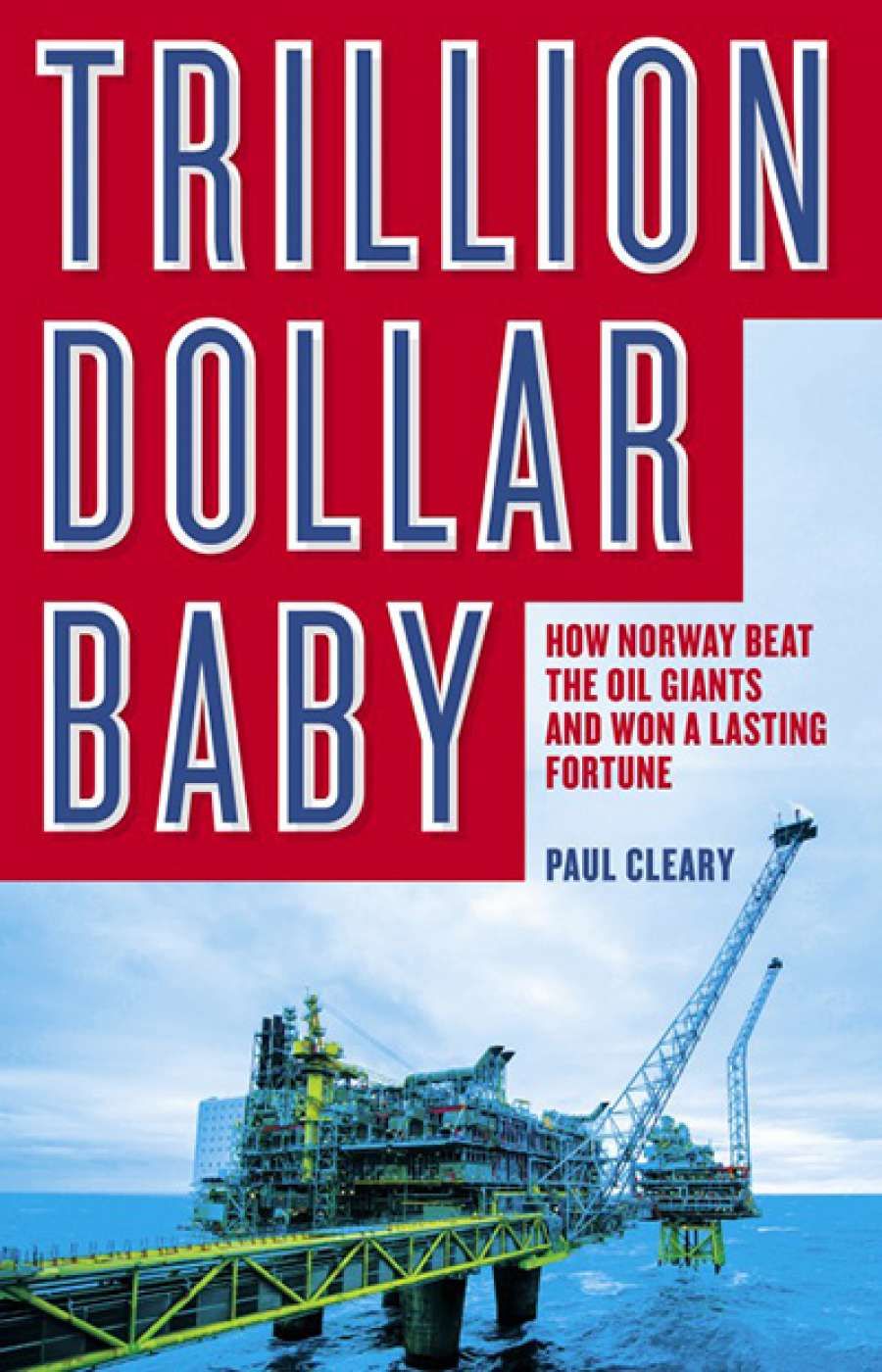
- Free Article: No
- Contents Category: Norway
- Custom Article Title: Adrian Walsh reviews 'Trillion Dollar Baby: How Norway Beat the Oil Giants and Won a Lasting Fortune' by Paul Cleary
- Custom Highlight Text:
The casual visitor to Oslo, with little or no knowledge of Norway’s recent history, could be forgiven for being unaware that per capita this is one of the wealthiest ...
- Book 1 Title: Trillion Dollar Baby
- Book 1 Subtitle: How Norway Beat the Oil Giants and Won a Lasting Fortune
- Book 1 Biblio: Black Inc. $27.99 pb, 235 pp, 9781863958961
Cleary outlines a number of reasons why the Norwegian state was able to extract such high rates of return. The first is that the Norwegian public service, which he describes as strong and highly competent, has a long history of negotiating with foreign resource companies as a result of the development of hydro-electric power in the early 1900s. A second reason that Cleary notes is the social democratic tradition that is to be found in most of the Nordic countries, and according to which resources are regarded as belonging to the nation as a whole and thus should be developed under full national control. The final reason is the absence of political opportunism on the part of all political groupings within Norway. This contrasts markedly with what transpired in many other resource-rich countries where oil companies were able to obtain extremely favourable contracts by dividing the political class. This they were unable to do in Norway. Even the conservative Progress party, which has low taxation within Norway as a central plank of its policy platform, are firm believers in the propriety of the nation’s high taxation upon petroleum products.
Cleary also addresses the significant question of how the Norwegians were able to avoid the so-called ‘resource curse’ which has afflicted many minerals producers. Here, the Dutch experience of the 1970s is said to be a case in point. It is one thing to obtain wealth, another matter entirely to ensure that it does not distort the economy (and another again to ensure the benefits are shared across the polity). Cleary argues that they have achieved this through their policy of investing all of their oil-related earnings in foreign currency, which means governments spend at a sustainable rate and the foreign resources provide a hedge during downturns in commodity prices.
 Oil Rigs at Coast Center Base outside Bergen (photograph by L.C. Nøttaasen, Wikimedia Commons)
Oil Rigs at Coast Center Base outside Bergen (photograph by L.C. Nøttaasen, Wikimedia Commons)
I had also hoped that the book might provide an overview of the philosophical underpinnings of their high taxation policies. This is an important issue in the Australian context where high levels of taxation have been regarded in mining circles as a form of theft. Unsurprisingly in a popular book such as this, there is little discussion of this question, though, intriguingly, there is a brief mention of the influence of the ideas of the theorist Henry George on hydro-power legislation enacted in 1909 – which, according to Cleary, had a lasting impact on Norwegian policy makers.
In addition to exploring comparative questions of public policy in broad outline, the book contains substantial sections describing the challenges involved with mining in the North Sea. The oil off the Norwegian coastline is often to be found more than 300 metres below the surface, and this presented substantive challenges for the divers, who remained below the surface for days at a time with saturated blood in their systems. These tales of ‘derring-do’ are fascinating, especially for readers such as myself who have never contemplated how oil rigs are actually built.
 Esso Oil storage depots on fire in Trondheim (photograph by Monrad Kjellby, Wikimedia Commons)This well-written book is primarily directed at a general public readership here in Australia. The lessons it contains are obvious. For most of its history, Australia has relied on the export of commodities for our financial well-being. Cleary argues that it is time that we recognised the finite nature of many of those resources and established institutional frameworks to ensure future generations will also benefit from the extraction of those resources. Cleary’s book is a timely reminder that our current political and economic arrangements are neither necessary nor inevitable. If politics is the art of the possible, Cleary’s book is important in expanding what we understand the scope of the possible to be.
Esso Oil storage depots on fire in Trondheim (photograph by Monrad Kjellby, Wikimedia Commons)This well-written book is primarily directed at a general public readership here in Australia. The lessons it contains are obvious. For most of its history, Australia has relied on the export of commodities for our financial well-being. Cleary argues that it is time that we recognised the finite nature of many of those resources and established institutional frameworks to ensure future generations will also benefit from the extraction of those resources. Cleary’s book is a timely reminder that our current political and economic arrangements are neither necessary nor inevitable. If politics is the art of the possible, Cleary’s book is important in expanding what we understand the scope of the possible to be.


Comments powered by CComment